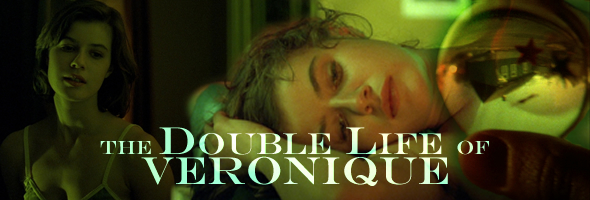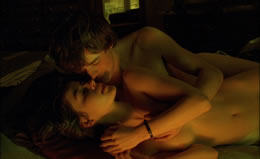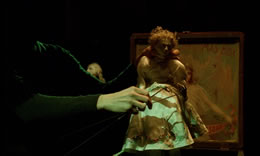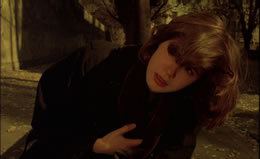The idea of a woman's life being haunted by a doppelgänger had certainly been handled before this film (ranging all the way from a Twilight Zone episode to the mediocre Julia and Julia), not to mention a more superficial imitation later with Sliding Doors, but no one did it better than here. The stunningly beautiful Irène Jacob stars as Polish soprano Weronika and French music instructor Véronique, whose lives share an unspoken spiritual bond that includes includes the presence of a parent, music, and learning intuitively from each other's mistakes. When tragedy strikes, Véronique finds herself shaken and emotionally adrift but looking for enlightenment and personal on her own terms.
The Criterion extras manage to cover the film and its director in great detail without losing any of the main feature's aura of mystery. You get three earlier Kieslowski documentary shorts, 1970's "Factory," 1976's "Hospital," and 1980's "Railway Station," along with a short by his mentor, Kazimierz Karabasz, from 1958 entitled "The Musicians" (whose relevance here should be obvious from the title). The 1991 documentary "Kieslowski Dialogue" features some welcome footage from the set and interview footage with the filmmaker, while "1966-1988: Kieslowski, Polish Filmmaker" from 2005 covers his earlier feature work, documentary and fiction shorts, and TV work. Jacob appears for a 2005 video interview along with both the cinematographer and composer who go into detail about working with the late director on this film and, indirectly, other projects. Also included is the slightly extended, more traditionally "heartwarming" ending which was added for American audiences at the behest of Harvey Weinstein. As usual for Criterion, the meaty insert booklet contains liner notes by Jonathan Romney, Slavoj Zizek, and Peter Cowie, plus snippets from the book Kieslowski on Kieslowski relevant to this particular title. Definitely an essential title for anyone with a love for world cinema or the modern era's truly great directors.

Color, 1991, 98m.
Directed by Krzysztof Kieslowski
Starring Irène Jacob, Halina Gryglaszewska, Kalina Jedrusik, Jerzy Gudejko
Criterion (Blu-Ray & DVD) (US RA/R1 HD/NTSC), Artificial Eye (Blu-Ray & DVD) (UK R0 HD/PAL) / WS (1.66:1) (16:9) / DD2.0
 Despite a career in both features and shorts stretching back several years, Polish director Krzysztof Kieslowski didn't reach full directorial maturity until the age of 48 when, in 1989, he completed The Decalogue, a landmark ten-part miniseries that laid the artistic groundwork for the four theatrical features for which he is best remembered. Released one year after The Decalogue, his haunting study in emotional and political duality, The Double Life of Véronique, became an international critical and art house sensation, earning a theatrical release in America from Miramax and paving the way for his Three Colors masterpieces of Blue, White, and Red.
Despite a career in both features and shorts stretching back several years, Polish director Krzysztof Kieslowski didn't reach full directorial maturity until the age of 48 when, in 1989, he completed The Decalogue, a landmark ten-part miniseries that laid the artistic groundwork for the four theatrical features for which he is best remembered. Released one year after The Decalogue, his haunting study in emotional and political duality, The Double Life of Véronique, became an international critical and art house sensation, earning a theatrical release in America from Miramax and paving the way for his Three Colors masterpieces of Blue, White, and Red.
 What this all ultimately means, if anything, proves to be beside the point as each viewer will likely come away with a slightly different interpretation. As with the three films following it, Véronique operates on a intuitive level that provokes an emotional response through its hypnotic cinematography by Slawomir Idziak (who since went on to much more mainstream fare like Black Hawk Down and Gattaca) and a powerhouse score by Zbigniew Preisner, who was fresh off of Europa Europa at the time. Though much of her career has since been underwhelming, Jacob is marvelous here and perhaps even exceeded this with her later reunion with Kieslowski on Red, creating a brief but potent director/actor synchronicity for the ages.
What this all ultimately means, if anything, proves to be beside the point as each viewer will likely come away with a slightly different interpretation. As with the three films following it, Véronique operates on a intuitive level that provokes an emotional response through its hypnotic cinematography by Slawomir Idziak (who since went on to much more mainstream fare like Black Hawk Down and Gattaca) and a powerhouse score by Zbigniew Preisner, who was fresh off of Europa Europa at the time. Though much of her career has since been underwhelming, Jacob is marvelous here and perhaps even exceeded this with her later reunion with Kieslowski on Red, creating a brief but potent director/actor synchronicity for the ages.
 Though it was unavailable in America for several years on home video due to various legalities involving the Miramax library, Véronique eventually resurfaced when the rights passed over to French entity MK2. Criterion first released it as a nicely appointed DVD edition and then an even more satisfying Blu-Ray whose high-definition transfer puts to shame many of the repertory prints (which were also frequently misframed at 1.85:1). A slightly earlier Blu-Ray release in UK from Artificial Eye may seem slightly tempted as it features a reworked 5.1 soundtrack (if you're into that; the lossless DTS-HD 2.0 version on the Criterion sounds fine) and has no region locking.
Though it was unavailable in America for several years on home video due to various legalities involving the Miramax library, Véronique eventually resurfaced when the rights passed over to French entity MK2. Criterion first released it as a nicely appointed DVD edition and then an even more satisfying Blu-Ray whose high-definition transfer puts to shame many of the repertory prints (which were also frequently misframed at 1.85:1). A slightly earlier Blu-Ray release in UK from Artificial Eye may seem slightly tempted as it features a reworked 5.1 soundtrack (if you're into that; the lossless DTS-HD 2.0 version on the Criterion sounds fine) and has no region locking.
![]()